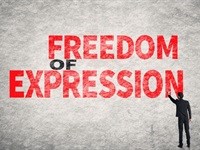PARIS, FRANCE: Media freedom suffered a "drastic decline" worldwide last year in part because of extremist groups such as Islamic State and Boko Haram, the watchdog group Reporters Without Borders said in its annual evaluation released Thursday.
"There has been an overall deterioration linked to very different factors, with information wars, and action by non-state groups acting like news despots," the head of the Paris-based group, Christophe Deloire, told AFP.
Increase in violation of freedom
The Reporters Without Borders 2015 World Press Freedom Index stated that there was an eight percent increase in the violations of freedom of information in 180 countries in 2014 compared to the 2013, according to its statistically weighted calculation.
All parties in conflicts raging in the Middle East and Ukraine were waging "a fearsome information war" where media personnel were directly targeted to be killed, captured or pressured to relay propaganda, it said.
The Islamic State group active in Syria and Iraq, Boko Haram in northern Nigeria and Cameroon, and criminal organisations in Italy and Latin America all used "fear and reprisals to silence journalists and bloggers who dare to investigate or refuse to act as their mouthpieces," said the watchdog, known by its French initials RSF.
North Africa and the Middle East contained notable "black holes" in which "entire regions are controlled by non-state groups in which independent information simply does not exist," the group said.
"The criminalisation of blasphemy endangers freedom of information in around half of the world's countries," the report said, noting that religious extremists sometimes also go after journalists or bloggers they believe do not sufficiently respect their god or prophet.
RSF's ranking put Iran, China, Syria and North Korea among the countries with the very worst levels of press freedom out of the 180 evaluated.
Decrease in press freedom
Repression of journalists in Ukraine during its early-2014 uprising against its pro-Kremlin president, and in Turkey during anti-government demonstrations earned both spots in the bottom quarter of the table.
"Police misconduct" during the Occupy Central protests in Hong Kong earned that territory a slide to 70th position.
The best-rated nations were northern European states such as Finland, Norway, Denmark, the Netherlands and Sweden, with New Zealand, Canada and Jamaica also making the top 10.
But some other European countries did not do so well. Italy, for instance, fell 24 spots to 73rd position because of mafia threats and "unjustified defamation suits". Overall, "the EU appears to be swamped by a certain desire on the part of some members states to compromise on freedom of information," the report said.
The United States ranked 49, three spots lower than in the previous report, in part because of what RSF said was the US government's "war on information" against WikiLeaks and others.
In South America, Venezuela stood out with a 20-notch fall to a ranking of 137 due to the National Bolivarian Guard opening fire on clearly identified journalists during demonstrations.
Libya dropped 17 places to 154 because of the national chaos that has seen seven journalists murdered and 37 kidnapped.
Russia slipped to the 152nd spot after introducing "another string of draconian laws," website blocking and the extinction of independent media.
"Press freedom... is in retreat on all five continents," RSF declared, claiming its indicators were "incontestable".
Source: AFP via I-NET Bridge










